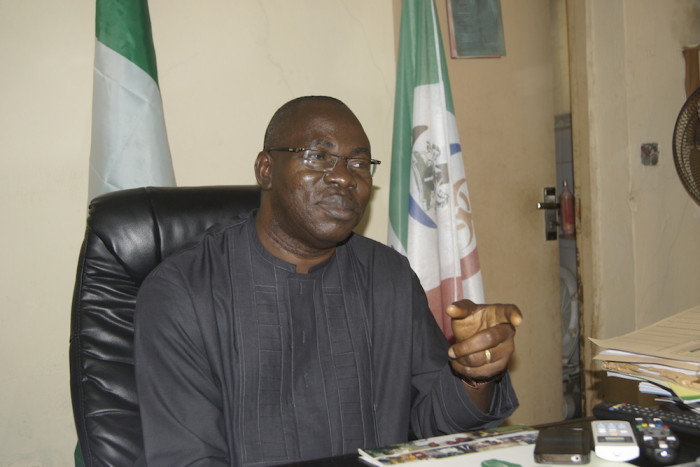The leadership of the National Biosafety Management Agency (NBMA) says the agency was established to ensure the safety of Genetically Modified Organisms (GMOs), not to stop the product’s dissemination and use.

Dr Rufus Ebegba, the Director-General of the agency, who made this known to the News Agency of Nigeria (NAN) on Thursday, December 20, 2018 in Abuja, said: “NBMA is a government agency established by law as a regulatory agency to ensure the safe handling and use of modern biotechnology and its products, which include GMOs.
“So, the establishment of the agency is not to stop the use of GMOs but to ensure their safety that they have no adverse effect on human health, plants, animals and the environment.’’
On the recent public presentation of the application for the commercialisation of genetically modified Pod Borer Resistant (PBR) Cowpea, Ebegba said that the agency was mindful of the implications of wrong decisions and the failure to act with courage and efficiency.
“The Institute for Agricultural Research (IAR), and Ahmadu Bello University, Zaria, following the approvals from the Federal Ministry of Environment and NBMA conducted confined field trials at selected sites in Nigeria on the PBR Cowpea for nine years.
“Over the years, the ministry’s Biosafety Unit and NBMA closely supervised the trials’ process during which all the requirements pertaining to biosafety compliance were fully met.
“Accordingly, IAR submitted to the NBMA a formal application, seeking permit for the general release of the PBR Cowpea in Nigeria, pursuant to the provisions of the NBMA Acts, 2015 and the National Biosafety Regulations.
“The application for commercial release of GM food crop, is the first of its kind and in line with the NBMA Acts.
“It requires the agency to build on the past efforts to make certain that stakeholders are aware of the basic science of PBR Cowpea and the biosafety measures put in place by NBMA.
“We organised public presentations to afford the agency the opportunity to sustain momentum in its various efforts to ensure information sharing and dissemination among stakeholders.
“We enhance public participation in our decision-making process by inviting representatives of agencies that we have signed MoUs with for synergy and for effective biosafety regulation in the country.
“Representatives from relevant ministries, departments and agencies, experts, scientists, the media, professional bodies including NBA, Civil Society Groups (including environmental activists opposed to the technology) partners and faith-based organisations for obvious reasons.”
Ebegba said that the objective was for the applicant to take stakeholders through the basic science of the genetically modified cowpea and other relevant issues related to the safety of the gene of insert and the processes of the development of the GM Cowpea.
“At the end of the presentation, there would be a 21day public notice in three national dallies and on the agency’s website on the application, indicating the locations where the application/dossier would be deposited.
“This will enable members of the public to review the application and present their views to the NBMA.
“NBMA will also constitute a National Biosafety Committee and National Biosafety Technical Subcommittee of Eminent Experts and Scientists to carry out detailed review of the risk assessment and risk management and make recommendations to guide the NBMA’s final decision.
“I wish to assure the public that the NBMA would carry out a thorough risk assessment review of the application and make the best decision in the interest of Nigerians and the nation.
He said that NBMA as a competent national authority on biosafety in Nigeria had since inception faced various criticisms by some environmental activists.
“Some of these activists have released some publications and held public fora aimed at discrediting the agency and continually fed Nigerians with contradictory and false information about the agency.
“While the agency believes that citizens are free to criticize government agencies’ decisions, it is expected that such criticism should not be without relevant knowledge.
“And should not be intended to damage the integrity of officers who are carrying out their legitimate duties in the implementation of the mandate of the officers.’’
Ebegba said that those who constantly criticise NBMA never at any time visited the agency to find out why the agency took whatever decisions it took.
“Even when they are invited to our programmes, they refuse to attend.
“We must remember that the world’s development is dynamic, and the world will not wait for Nigeria.”
He noted that every new technology was bound to face suspicion, but Nigeria should not fail to move on and develop the technology.
“In spite of the various enlightenment programmes of the agency and its engagement with the public on the mandates and workings of the agency, the agency is still confronted with controversies.
“Despite the odds, the NBMA has continued to discharge its duties to the people of Nigeria while meeting the mandate of government with knowledge and courage.
“Be rest assured that the agency will not fail in the discharge of its responsibility in the regulation of the application of modern biotechnology, handling and use of genetically modified organism.”
NAN reports that the agency draws its mandate from the NBMA Act 2015.
The act states that the agency is charged with the responsibility of providing regulatory framework, institutional and administrative mechanism for safety measures in the application of modern biotechnology in Nigeria;
This is with the view to preventing any adverse effect on human health, animals, plants and the environment.’’
By Ebere Agozie
